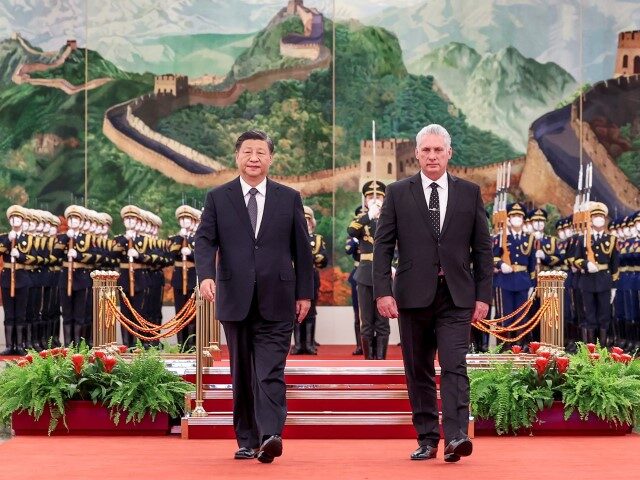China and Cuba are holding advanced negotiations to establish a joint military training facility on Cuban soil, according to a report based on anonymous sources published by the Wall Street Journal on Tuesday.
The report cites current and former U.S officials, who expressed concerns that the prospective military training facility, which would allegedly be built on Cuba’s northern coast, could lead to the stationing of Chinese troops and other security and intelligence operations just 100 miles off Florida’s coast and on the same island as a critical U.S. military facility.
U.S. intelligence reports, according to the newspaper, suggest that discussions for the joint base between China and Cuba’s communist regimes are at an advanced stage, but not concluded. The Biden administration reportedly contacted Cuban officials to request they forestall the deal, tapping into Cuban concerns over ceding sovereignty.
The Wall Street Journal‘s report follows U.S. Secretary of State Antony Blinken visiting China this week, meeting with Chinese dictator Xi Jinping on Monday to discuss the bilateral relationship generally. The meeting resulted in no substantive agreements or changes in Beijing-Washington ties.
Last week, the White House confirmed reports of the existence of a Chinese spy base in Cuba since at least 2019 — although reports that the Chinese spy base was “upgraded” in 2019 suggest that the spy facility had already been in operation for an undetermined period of time prior to 2019.
China denied the reports of a Chinese spy base on Cuban soil shortly afterwards. The Chinese Global Times newspaper described the report as an “old-fashioned and crappy … script” intended to derail Blinken’s visit.
The Wall Street Journal’s allegations follow years of reports and concerns of Chinese troop presence on the island. A 2021 report by the outlet ADN Cuba, for example, accused China of sending paramilitaries to Cuba to train the Castro regime’s “black beret” repressive forces, publishing alleged photo evidence. The black berets have been deployed by the Castro regime numerous times to suppress pro-democracy protests in the nation.
Cuba, ruled by the communist Castro regime for more than six decades, agreed to join China’s Belt and Road Initiative (BRI) in 2018 during an official visit by the Castro regime’s figurehead President Miguel Díaz-Canel to Beijing.
BRI is a program used by the Chinese Communist Party to ensnare countries through the use of predatory, often unfavorable and unpayable, “debt trap” loans for the construction of infrastructure projects that allow China to eventually seize the constructed infrastructure or exert pressure on nations that find themselves unable to repay.
In August, China was able to further exert influence on Cuba through the offering of its “assistance” to the Castro regime to help fight off a massive oil tank fire that erupted in the nation’s largest fuel depot located in Matanzas province.
In late November, during Díaz-Canel’s latest visit to Beijing, China handed over a $100 million “gift” donation to the Cuba as the island nation found itself in a desperate situation resulting from six decades of communist mismanagement. Neither regime issued a public explanation of what the donation was meant to fund.
Over the past years China has expanded its presence in Latin American territories through cooperation in a series of alleged space stations and growing influence in some of the region’s most important maritime ports.
“We are facing a very broad strategy, and it was only in the last four or five years that the United States realized the consequences of China’s global economic power and that it became a major military national security problem, not only for us, but also for many other countries in Asia and the rest of the world,” Dr. Jonathan Ward, an American expert on China-U.S. global competition issues told the Argentine newspaper La Nación last week.
“For Latin America, the consequences would really be a long-term economic dependence on China and the possibility of China exercising significant military and diplomatic influence in the continent,” he added.
Reports published in March indicated that China is in talks with the leftist government of Argentina to give China the ability to exploit the Paraná-Paraguay waterway, a long natural river that allows for continuous navigation between the ports of Argentina, Brazil, Bolivia, Paraguay and Uruguay. If a deal is achieved, China will exert control over a large part of South America’s grain trade.
China finished building a military space station in 2017 located in Argentina’s Patagonia region. China keeps the operations of the facility and its 16-story antennas under complete secrecy, claiming that the station’s operations are for “peaceful space observation and exploration.”
Two years later, Pentagon officials warned about the potential threats China’s Patagonia base represented, noting growing concerns that the Chinese base could monitor and potentially target U.S. and allied satellites.
Christian K. Caruzo is a Venezuelan writer and documents life under socialism. You can follow him on Twitter here.

COMMENTS
Please let us know if you're having issues with commenting.